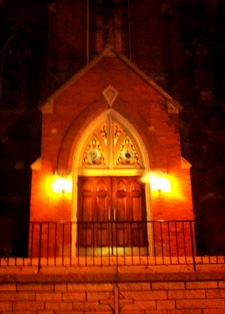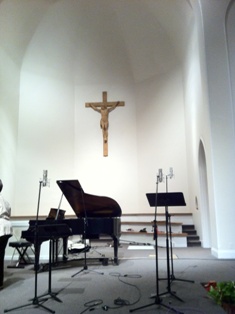
Mack's "Secret of Luca" On Its Way
There was plenty of music in
Cincinnati Saturday night (Nov. 17), but vocally speaking, some of the best
could be had at tiny St. Anthony Church in Madisonville.

The occasion was a concert performance of composer Evan Mack’s new opera “The Secret of Luca.”
It may have been somewhat déjà vu for Mack, whose first opera “Angel of the Amazon,” received its introduction in Cincinnati when the Blue Ash Symphony performed excerpts in Sept. 2010. “Angel of the Amazon,” a true-life story about Roman Catholic nun Dorothy Stang, murdered by logging interests in Brazil in 2005, has been very well received since, having been staged by Encompass New Opera Theatre in New York City and recorded by Albany Records to glowing reviews.
After “Angel of the Amazon,” Mack wanted to write a different kind of opera, he said. “People sent me things. Many were politically based. However, I did not want to do something solely about politics. Since my first opera lacked a love story, I knew I wanted something in that direction.”
Mack’s father, Edward Mack, had just what Evan was looking for in his translation of Italian author Ignazio Silone’s1956, novel “Il Segreto di Luca.” Mack’s father, a Dante scholar, translated it into English in 1980. Mack sent the novel to Joshua McGuire, a faculty member at the Blair School of Music at Vanderbilt University, who wrote the libretto.
Set in Cisterna, Italy in 1950 and 1910, it is the story of Luca Sabatini, a man who returns to his home village after spending 40 years in prison for a murder he did not commit. Luca meets Andrea Cipriani, a political activist also making a return visit to Cisterna. Cipriani, it seems, knew Luca’s mother when he was a child, and spent time in her house after Luca’s imprisonment. He becomes obsessed with why Luca put up no defense at his trial. The answer demonstrates the power of love at its most extreme.
Most of the roles were sung by
alumni(ae) of the University of Cincinnati College-Conservatory of Music,
including baritone Jose Rubio as Luca.
(Rubio sang Luiz in the New York production of “Angel of the Amazon.”) Music director was opera vocal coach
Jennifer Quammen McGuire of Vanderbilt, who accompanied at the piano. The cast sang in partial costume – a
cap here, an armband there, parts of a nun’s habit – and the performance took
place in the church sanctuary beneath a large crucifix.

Members of the audience were given librettos to follow along with the music and were asked to provide written comments between acts. This, said Mack, will assist in enhancing and improving the opera in order to take it “from page to stage.”
Mack (also a CCM alumnus) describes “The Secret of Luca” as “modern American verismo, a fusion of contemporary rhythmic intensity and Puccinian soundscape.” When orchestrated, the latter will become more apparent, but the lushness of the music was evident throughout the opera, and its focus on everyday life in an Italian village is quite literally verismo.
The quasi-religious tone of the work sets it on an even higher plane. “Who’s there? Who on a Friday?” sings the Blind Woman (mezzo-soprano Audrey Wahlstrom), who senses Luca’s presence as he steals into town in the opening scene of Act I. “I remember it was a Friday” (the day of Jesus’ crucifixion).
Scene 2 begins with a lively march, as the Mayor (tenor Ryan Connelly) and Police Chief (bass Robert Wray) prepare to welcome Cipriani (tenor Andrew Jones), who they hope will be able to do good things for the village through his political connections. They are distressed at his sudden interest in Luca (Rubio), whose return they do not welcome, and the scene ends in confusion. Only Father Serafin, the parish priest (baritone Michael Young), counsels peace.
Scene 3, in which Cipriani meets Luca, casts the mystery deeper, edging it with pain and anguish as Cipriani (Jones) flails Luca with a penetrating high note on “Your silence killed your mother!”
Act II, set 40 years earlier, opens bright and staccato with Luca’s fiancée Lauretta (mezzo Wahstrom) preparing for their wedding the next day. A wedding gift from Ortensia, the village beauty, arrives for Lauretta, a golden necklace inlaid with emeralds. Though Father Serafin counsels him to ignore it, Luca cannot. He tears it from Lauretta’s neck and stalks out angrily.
Scene 2, the tense love scene between Luca and the married Ortensia (soprano Megan Hammann) has been very well crafted by Mack, who assigns her a high tessitura as if to underscore her distraction and despair. Scene 3 at Lauretta’s family home opens with a brindisi (drinking song) a la Verdi’s “La Traviata.” Rubio as Luca counters with a doleful aria -- he cannot be happy -- which lets the air out of Lauretta’s balloon. He breaks their engagement and the dismay and anger of the guests make for a strong ensemble finale.
Opening on a dissonant chord, Act III brings the action back to 1950 in Cisterna. The city officials want both Cipriani and Luca out of town as soon as possible to prevent disorder among the townspeople. Father Serafin offers to help. When the Police Chief reveals that Ortensia now lives in a convent, Cipriani resolves to go see her, but Luca, realizing that he has imprisoned her for 40 years, is afraid: “If I see her face to face, will those eyes convict me?”
It is too late, however. When Cipriani arrives at the convent (Scene 2), the Abbess (soprano Danielle Messina) informs him that Ortensia died the previous (yes) Friday. Messina and Jones handled their arias beautifully here. The Abbess sings of Ortensia’s suffering and gives Cipriani her sealed diary. Jones, the activist who advocates equality for all mankind, suddenly realizes that “a man can be greater through love.”
The final scene reveals Luca’s secret at last. As Cipriani hands Luca the diary, Luca explains why he failed to account for his whereabouts on the night of the murder: Intending to commit suicide, he was saying farewell to Ortensia. Though all they exchanged was an embrace, it was enough, he said, “to die free, with all of your love imprisoned in my heart.” As he sings his recollection, Ortensia enters, appearing as she did 40 years earlier, to sing their final, lustrous duet.
The cast for the opera, which runs 90-100 minutes, was uniformly strong and convincing (kudos also to mezzo-soprano Ellen Graham for her multiple roles). From Cincinnati, it will go to the University of Texas in Austin, where scenes will be work-shopped, using some of the same singers who performed at St. Anthony Church.